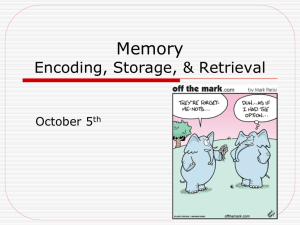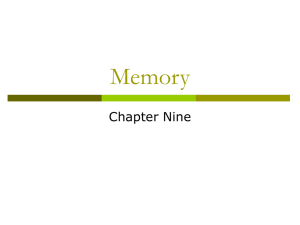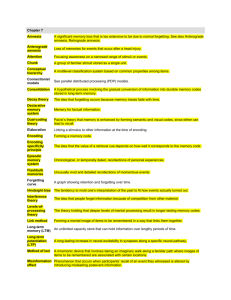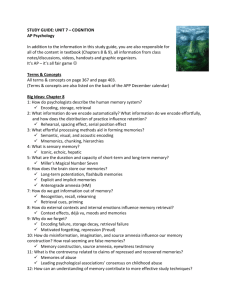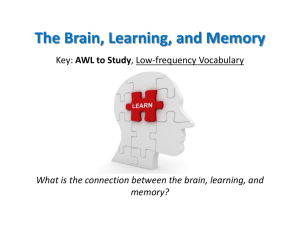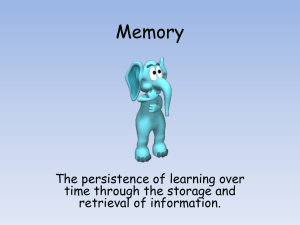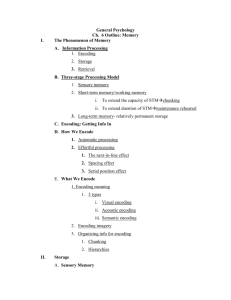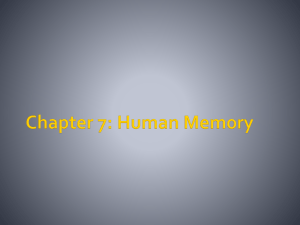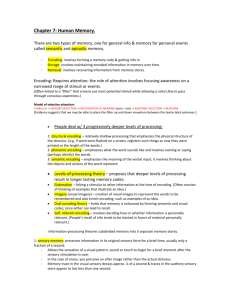Unit 5 - Memory
advertisement
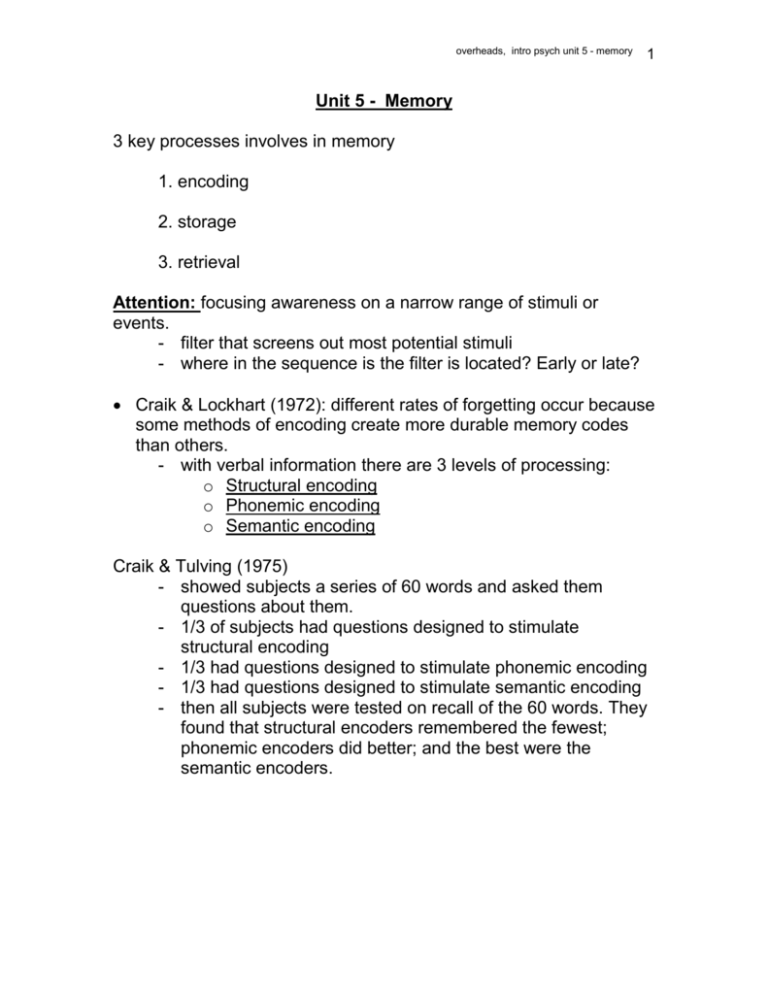
overheads, intro psych unit 5 - memory 1 Unit 5 - Memory 3 key processes involves in memory 1. encoding 2. storage 3. retrieval Attention: focusing awareness on a narrow range of stimuli or events. - filter that screens out most potential stimuli - where in the sequence is the filter is located? Early or late? Craik & Lockhart (1972): different rates of forgetting occur because some methods of encoding create more durable memory codes than others. - with verbal information there are 3 levels of processing: o Structural encoding o Phonemic encoding o Semantic encoding Craik & Tulving (1975) - showed subjects a series of 60 words and asked them questions about them. - 1/3 of subjects had questions designed to stimulate structural encoding - 1/3 had questions designed to stimulate phonemic encoding - 1/3 had questions designed to stimulate semantic encoding - then all subjects were tested on recall of the 60 words. They found that structural encoders remembered the fewest; phonemic encoders did better; and the best were the semantic encoders. overheads, intro psych unit 5 - memory 2 Ways to Enhance Encoding Elaboration: linking a stimulus to other information at the time of encoding. Visual Imagery: creating visual images to represent the words to be remembered. - Paivo, Smythe & Yuille (1968). - dual code theory: memory is enhanced by forming semantic and visual codes, since either can lead to recall. Self-Referent Encoding: deciding how or whether information is personally relevant. Information processing view: memory can be understood as having 3 different stores: the sensory store, the short-term store, and the long-term store. Sensory memory: preserves information in its original sensory form for a brief time, usually only a fraction of a second. - lasts only about ¼ of a second - Sperling (1960) Short-Term Memory (STM) (a.k.a. working memory): a limitedcapacity store that can maintain unrehearsed information for up to about 20 seconds - Rehearsal is the process of repetitively verbalizing or thinking about the information - Peterson & Peterson (1959) - 7 +/- 2 units - increase the capacity by chunking overheads, intro psych unit 5 - memory 3 Long term memory: an unlimited capacity store that can hold information over lengthy periods of time. Is information in there forever? - flashbulb memories: unusually vivid and detailed recollections of momentous events - reports of exceptional recall through hypnosis, of events from childhood - Wilder Penfield’s finding that people reported old memories on stimulation of certain areas of the cortex - However, flashbulb memories fade with time and are not as accurate as once believed; hypnosis-aided recall often turns out to be incorrect; and Penfield’s “memories” were often fantasies, dreams, & hallucinations. Some of the organizational structures of the LTM: Clustering: the tendency to remember similar or related items in groups Conceptual Hierarchy: a multilevel classification system based on common properties among items Schemas: organized clusters of knowledge about a particular object or event abstracted from pervious experience with the object or event. Script: a particular kind of schema that organizes what people know about common activities. Semantic Network: nodes representing concepts, joined together by pathways that link related concepts - Collins & Loftus (1975): when people think about a word, their thoughts naturally go to related words, in a process called spreading activation. - strength decreases as it travels outward overheads, intro psych unit 5 - memory retrieval cues: stimuli that help gain access to memories. Context: being in the same context where information was first encoded facilitates the retrieval of information. Memories get distorted and may include details that weren’t actually there Loftus (1979, 1992): the misinformation effect in eyewitness testimony. - 3 stages: 1) subjects view an event 2) they are exposed to information about this event, some of which is misleading 3) their recall of the original event is tested to see if the misleading information has altered their memory Loftus & Palmer (1974): car crash study Source Monitoring and Reality Monitoring: the misinformation effect appears to be due in part to the unreliability of source monitoring: the process of making attributions about the origins of memories. a source monitoring error occurs when a memory derived from one source is misattributed to another source. People often feel quite confident about these attributions, even when inaccurate some subjects in studies have “insisted” they remember seeing something that was only verbally suggested to them “cryptomnesia”: inadvertent plagiarism that occurs when people come up with an idea they think is original when actually they were exposed to it earlier. 4 overheads, intro psych unit 5 - memory 5 Reality monitoring: the process of deciding whether memories are based on external sources (one’s perception of actual events) or internal ones (one’s thoughts, imagination, dreams) when the memory is rich in sensory or contextual information, or it can be retrieved with little effort, we are likely to infer it is a memory of a real event. Forgetting: can be caused by deficiencies in encoding, storage, retrieval, or some combination of these processes. Measures of Forgetting retention: the proportion of material retained a recall measure of retention requires subjects to reproduce information on their own without any cues a recognition measure of retention requires subjects to select previously learned information from an array of options. These are generally easier than recall tasks. A relearning measure of retention requires subjects to memorize information a second time to determine how much time or effort is saved by having learned it before. - calculate a savings score to indicate how much they had retained from the first time Some possible causes of forgetting: Ineffective encoding: maybe the information never got put into memory in the first place, usually due to a lack of attention (“pseudoforgetting”) encoding may be ineffective; some approaches toe encoding lead to more forgetting than others overheads, intro psych unit 5 - memory 6 Decay: forgetting can be due to memory traces fading with time occurs at the site of the physiological mechanisms responsible for memories decay has been shown to contribute to loss of information from the sensory store and STM but not for LTM time going by isn't as important as what happens during that time particularly if learning other information has led to interference. Interference: people forget information because of competition from other material greatest effects when the intervening material is most similar to the test material McGeoch & McDonald (1931) 2 kinds of interference - Retroactive interference: when new information impairs the retention of previously learned information. - Proactive interference: when previously learned information interferes with the retention of new information. Retrieval Failure: people often remember something that they couldn’t remember previously may be due to a breakdown in the process of retrieval retrieval failures may be more likely when a mismatch occurs between retrieval cues and the original encoding of the information. - encoding specificity principle: the value of a retrieval cue depends on how well it corresponds to the memory code. Motivated Forgetting: Freud: retrieval is blocked by unconscious avoidance tendencies, i.e. “repression”. some research suggests that people don’t remember anxietyladen material as readily as emotionally-neutral material. overheads, intro psych unit 5 - memory 7 Recent interest in the issue of repressed memories: instances of “recovered” memories of accusations of childhood abuse most allegations do not have independent corroboration are these false memories? Organic amnesia: memory loss due to head injury Retrograde amnesia: loss of memories for events that occurred prior to the onset of amnesia. Anterograde amnesia: loss of memories for events that occur after the onset of amnesia. The famous case of H.M. the hippocampal region is probably important in the consolidation of memories: the gradual conversion of information into durable memory codes stored in long term memory. Patients with anterograde amnesia appear to have no ability to form new long-term memories. But certain kinds of testing reveal that this isn't exactly true. implicit memory: when retention is exhibited on a task that does not require intentional remembering. explicit memory: involving intentional recollection of previous experiences Some theorists believe that these 2 kinds of memory are handled by independent memory systems: declarative and procedural memory. Declarative memory: recollections of factual information like words, definitions, names, dates, faces, events, concepts, ideas Procedural memory: recollections of actions, skills, operations, and conditioned responses (e.g. how to ride a bike, tie your shoes, type) Maybe implicit memory is a function of the procedural memory system and explicit memory is a function of the declarative memory system. overheads, intro psych unit 5 - memory 8 Tulving (1986; 1993) further subdivided declarative memory into episodic and semantic memory. Episodic memory: like an autobiography, personal events from your life that are temporally dated Semantic memory: like an encyclopedia, contains general knowledge that is not temporally tagged Prospective memory: remembering to perform actions in the future Retrospective memory: remembering events from the past or previously learned information. people vary tremendously in their ability to carry out prospective memory tasks habitual task are easier to remember than infrequent tasks event-based tasks are easier to remember than time-based tasks the older we are the more vulnerable we become to problems with prospective memory
